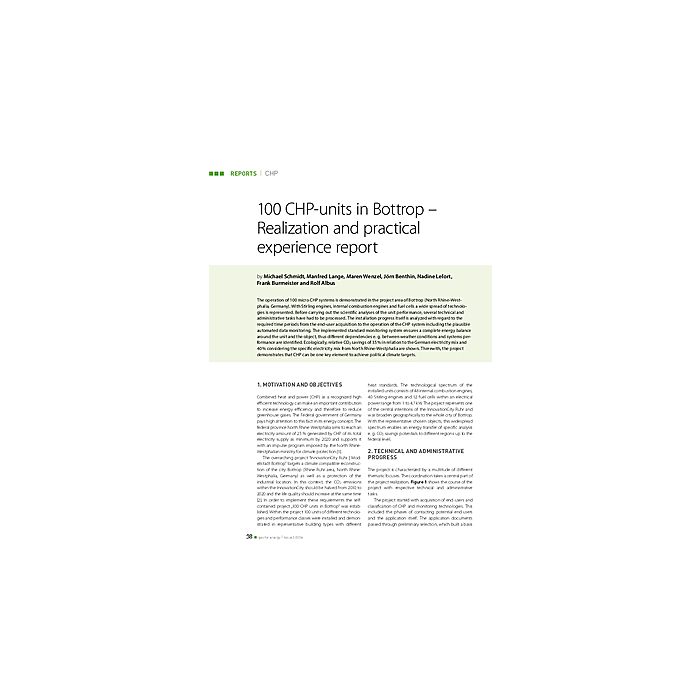100 CHP-units in Bottrop – Realization and practical experience report
4,90 €
Auf Lager
Artikelnummer
00258_2016_02_04
The operation of 100 micro CHP systems is demonstrated in the project area of Bottrop (North Rhine-Westphalia, Germany). With Stirling engines, internal combustion engines and fuel cells a wide spread of technologies is represented. Before carrying out the scientific analyses of the unit performance, several technical and administrative tasks have had to be processed. The installation progress itself is analyzed with regard to the required time periods from the end-user acquisition to the operation of the CHP system including the plausible automated data monitoring. The implemented standard monitoring system ensures a complete energy balance around the unit and the object, thus different dependencies e. g. between weather conditions and systems performance are identified. Ecologically, relative CO2 savings of 35 % in relation to the German electricity mix and 40 % considering the specific electricity mix from North Rhine-Westphalia are shown. Therewith, the project demonstrates that CHP can be one key element to achieve political climate targets.
| Autoren | Michael Schmidt / Manfred Lange / Maren Wenzel / Jörn Benthin / Nadine Lefort / Frank Burmeister / Rolf Albus |
|---|---|
| Erscheinungsdatum | 01.02.2016 |
| Format | |
| Zeitschrift | gas for energy - Ausgabe 02 2016 |
| Verlag | DIV Deutscher Industrieverlag GmbH |
| Sprache | English |
| Titel | 100 CHP-units in Bottrop – Realization and practical experience report |
| Beschreibung | The operation of 100 micro CHP systems is demonstrated in the project area of Bottrop (North Rhine-Westphalia, Germany). With Stirling engines, internal combustion engines and fuel cells a wide spread of technologies is represented. Before carrying out the scientific analyses of the unit performance, several technical and administrative tasks have had to be processed. The installation progress itself is analyzed with regard to the required time periods from the end-user acquisition to the operation of the CHP system including the plausible automated data monitoring. The implemented standard monitoring system ensures a complete energy balance around the unit and the object, thus different dependencies e. g. between weather conditions and systems performance are identified. Ecologically, relative CO2 savings of 35 % in relation to the German electricity mix and 40 % considering the specific electricity mix from North Rhine-Westphalia are shown. Therewith, the project demonstrates that CHP can be one key element to achieve political climate targets. |
Eigene Bewertung schreiben


